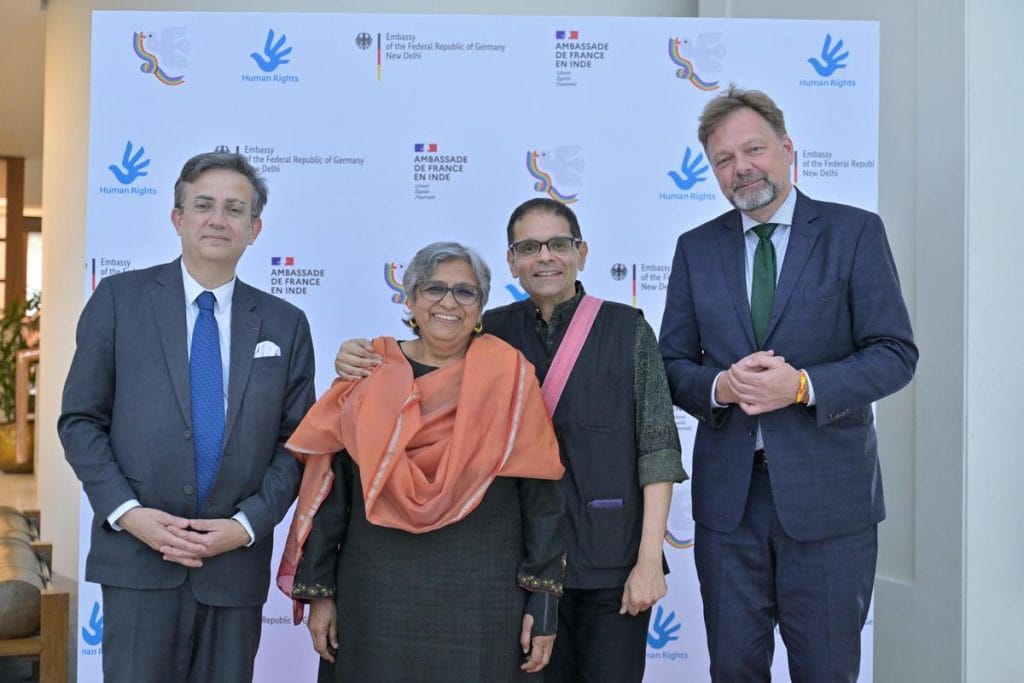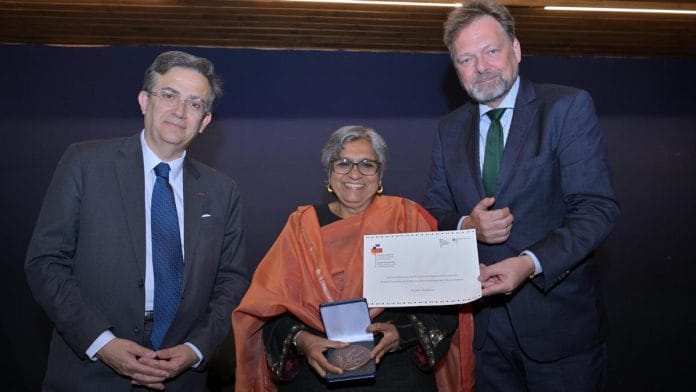New Delhi: In 2001, LGBTQ+ rights activist Anjali Gopalan was shaken by a harrowing visit. A young man, “dishevelled and visibly broken”, walked into her office, looking “absolutely shattered”. His parents had sent him for shock therapy at one of Delhi’s top hospitals, in an attempt to “cure” his homosexuality.
Gopalan approached the National Human Rights Commission (NHRC) to file a case, but was told there was nothing they could do. Homosexuality was still a crime in India. This has to change, Gopalan decided.
On Tuesday, 24 years after that incident, she received the prestigious Franco-German Prize for Human Rights and the Rule of Law at the French Embassy in Delhi for her efforts to change the status quo.
As the founder of the Naz Foundation, she collaborated with the Lawyers’ Collective, a group of legal professionals, to challenge Section 377, the law that criminalised homosexuality.
After a short-lived victory in 2009, when the Delhi High Court decriminalised homosexuality, the Supreme Court overturned its ruling in 2013.
Her resolve finally bore fruit in 2018, when the Supreme Court finally upheld the decriminalisation of homosexuality, marking a historic shift in India’s legal landscape. Moreover, the NHRC now has a LGBTQ+ committee.
“Change happens. If you allow yourself to be frightened and pushed into a corner, then you can’t do anything. You have to keep going because you know this is the right thing to do,” said Gopalan at the embassy.

She is the first Indian to ever win this award.
“Gopalan is an example of India’s strong and vibrant civil society, which can drive real change,” German ambassador Phillipp Ackermann told ThePrint.
The prize, launched in 2016, recognises individuals who have dedicated their lives to championing human rights. Gopalan’s decades-long fight for LGBTQ+ rights, and her role in decriminalising homosexuality in India, earned her the honour.
“She is an icon,” said French ambassador Thierry Mathou.
Also Read: This play about pleasure and abuse breaks the binary. It’s painful, messy and funny
Guns, gumption, and gays
It was an evening of revelry, resilience, and revelations. In conversation with author, former journalist, and LGBTQ+ activist Sharif Rangnekar, Gopalan reflected on her journey from the 1980s to now.
In those early years, her efforts were rooted in her family home in a Delhi residential colony, where she opened her first office.
“I remember neighbours protesting, saying, ‘What are these people doing here?’” she recalled. But her father, a steadfast ally, would shut them down firmly, saying, “This is my house, and if you have an issue, take it to court.”
That homegrown effort became the Naz Foundation—a lifeline for countless individuals, offering services ranging from HIV prevention and support to social and legal advocacy. Gopalan faced constant opposition, including death threats and personal attacks.

She recounted a chilling incident when a man, armed with a gun, chased her car through the streets of Delhi while she was sheltering an interreligious lesbian couple who had run away from home. The man was the father of one of them.
“Luckily, I knew Delhi better than that gentleman because he was from Bombay. But he had put a gun on the front of the car for everyone to see and we barely escaped,” she said.
Also Read: How queer are universities? Architect imagines DU north campus as a non-binary lesbian
Then and now
Even now, things aren’t easy. Gopalan said the environment still feels volatile and hostile. Gay people, she noted, still lack the fundamental rights many citizens take for granted. One of them is same-sex marriage.
“Recently, a case was brought to the courts seeking the right to marry, but the outcome has set progress back by decades. The (Supreme Court) passed the matter on to Parliament, which is concerning because such issues are rarely addressed there, and discussions are often scarce,” she said.
With no clear timeline for change, the community is left in limbo. Beyond the legal fight, there’s a cultural battle too. Male homosexuality is somewhat tolerated in India, as long as it doesn’t come with demands for rights. That tolerance, Gopalan pointed out, wanes the moment it does.
For women, especially lesbian and bisexual women, the struggle is even more difficult, as patriarchal norms place them at the bottom of the social ladder. Rights are scarce and so is support, Gopalan noted.
“Parents forbid me from talking to their children. They say, ‘You are making my child gay. Anyone who comes to NAZ becomes gay,’” she said.
It was then that an audience member reminded everyone why her work is so important. In 2011, when several gay men were arrested at a nightclub in Delhi, it was Gopalan who stood up for their rights.
“I am here, because you were there,” he said, to a round of applause.
(Edited by Asavari Singh)






